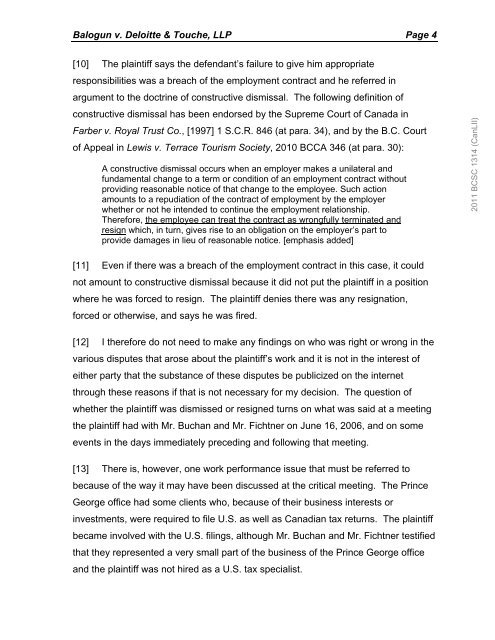FAQ's Cases - Stewart McKelvey
FAQ's Cases - Stewart McKelvey
FAQ's Cases - Stewart McKelvey
- No tags were found...
Create successful ePaper yourself
Turn your PDF publications into a flip-book with our unique Google optimized e-Paper software.
Balogun v. Deloitte & Touche, LLP Page 4[10] The plaintiff says the defendant’s failure to give him appropriateresponsibilities was a breach of the employment contract and he referred inargument to the doctrine of constructive dismissal. The following definition ofconstructive dismissal has been endorsed by the Supreme Court of Canada inFarber v. Royal Trust Co., [1997] 1 S.C.R. 846 (at para. 34), and by the B.C. Courtof Appeal in Lewis v. Terrace Tourism Society, 2010 BCCA 346 (at para. 30):A constructive dismissal occurs when an employer makes a unilateral andfundamental change to a term or condition of an employment contract withoutproviding reasonable notice of that change to the employee. Such actionamounts to a repudiation of the contract of employment by the employerwhether or not he intended to continue the employment relationship.Therefore, the employee can treat the contract as wrongfully terminated andresign which, in turn, gives rise to an obligation on the employer’s part toprovide damages in lieu of reasonable notice. [emphasis added]2011 BCSC 1314 (CanLII)[11] Even if there was a breach of the employment contract in this case, it couldnot amount to constructive dismissal because it did not put the plaintiff in a positionwhere he was forced to resign. The plaintiff denies there was any resignation,forced or otherwise, and says he was fired.[12] I therefore do not need to make any findings on who was right or wrong in thevarious disputes that arose about the plaintiff’s work and it is not in the interest ofeither party that the substance of these disputes be publicized on the internetthrough these reasons if that is not necessary for my decision. The question ofwhether the plaintiff was dismissed or resigned turns on what was said at a meetingthe plaintiff had with Mr. Buchan and Mr. Fichtner on June 16, 2006, and on someevents in the days immediately preceding and following that meeting.[13] There is, however, one work performance issue that must be referred tobecause of the way it may have been discussed at the critical meeting. The PrinceGeorge office had some clients who, because of their business interests orinvestments, were required to file U.S. as well as Canadian tax returns. The plaintiffbecame involved with the U.S. filings, although Mr. Buchan and Mr. Fichtner testifiedthat they represented a very small part of the business of the Prince George officeand the plaintiff was not hired as a U.S. tax specialist.
















